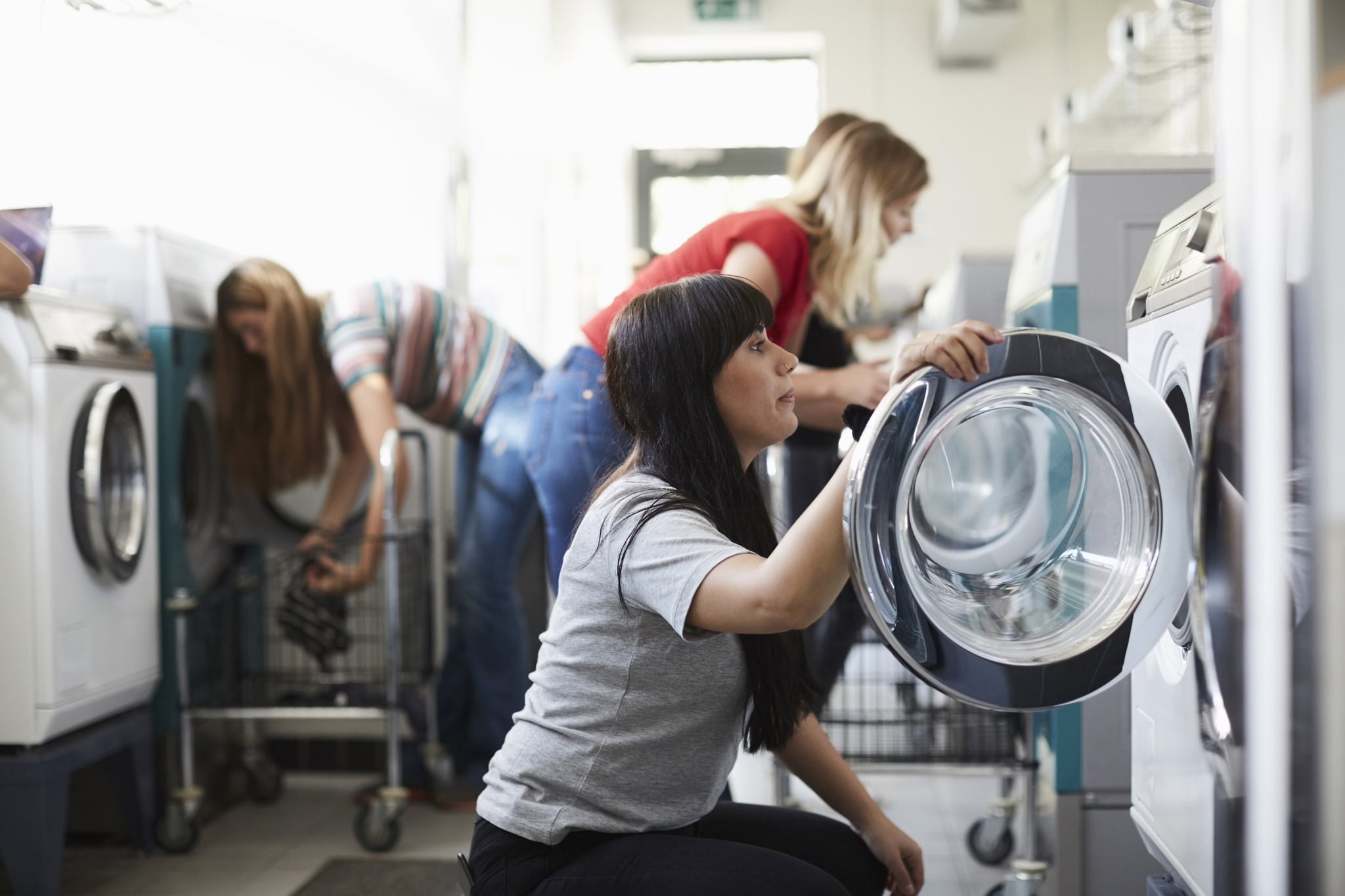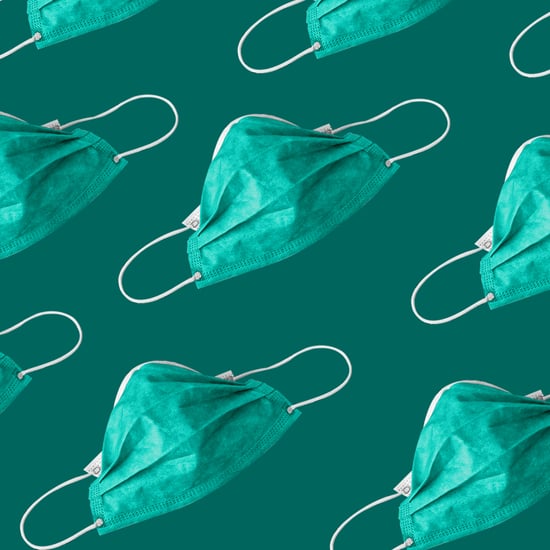How to Stay Safe in Public Spaces During Coronavirus
Going to the Grocery Store or Laundromat? Here's How to Protect Yourself From Coronavirus

Image Source: Getty / Maskot
Going out in public spaces while your town or city is implementing social distancing amid novel coronavirus might make you uneasy. After all, you should only be leaving your house to run errands when absolutely necessary. There are many places where only essential businesses are open right now, including healthcare services, grocery stores, and gas stations. Laundromats make the cut as well, depending on where you live. But, what should you do when you go out into these public spaces?
The FDA states on its website that there is no current evidence of "food, food containers, or food packageing being associated with transmission of COVID-19. Like other viruses, it is possible that the virus that causes COVID-19 can survive on surfaces or objects." According to a study in the New England Journal of Medicine, there is evidence that coronavirus lasts up to three days on plastic and stainless steel, and it can last on cardboard for up to 24 hours. The virus breaks down with time the longer it remains on surfaces.
Aside from handling food at a grocery store, for instance, another thing you might be worried about is not being able to properly practice social distancing while out in public places. That same study suggested that the virus can be sustained in the air for three hours. "That should be a warning to just take precautions in an enclosed environment," Maria Khan, MPH, an associate professor in New York University's Department of Population Health, who has a PhD in infectious disease epidemiology, told POPSUGAR. We've included guidelines from Dr. Khan and other sources to help you navigate how to stay safe and sanitized while outside your home running errands. We'll be focusing more specifically on grocery stores and laundromats here, but we'll also include general tips as well.
Grocery Store Sanitation Advice
Wipe down your cart. Many stores are offering alcohol-based wipes, but Dr. Khan said it's smart to bring extra with you to wipe down your shopping cart.
Commit to what you're buying beforehand. This advice is so that you don't go around touching more than what you need to touch, and it comes from Jeffrey VanWingen, MD, a doctor in Michigan, who posted a viral video on YouTube regarding what he considers to be safe grocery shopping.
Wear gloves. Dr. Khan said you can wear latex gloves to the supermarket as long as you dispose of them properly and wash your hands afterward. Same goes if you don't have latex and are wearing cloth gloves (she said she's seen some people wearing cloth gloves and, if that's the case, you should wash them after every use and scrub your hands immediately after taking them off). Additionally, don't touch your face with or without gloves.
Go to the store during off hours. Many food stores have modified hours and have also designated time in the day for older adults. That being said, Dr. Khan suggested trying to go when you think the food store might be less crowded so that you're able to practice better social distancing.
Keep hand sanitizer with you. Dr. Khan advised this if you're not wearing gloves. The hand sanitizer should contain at least 60 percent alcohol.
Wear a cloth face mask. Up until recently, the CDC did not recommend people who otherwise are not ill to wear face masks out in public. However, on April 3, it was announced that the CDC now advises the use of cloth face masks in public. President Donald Trump said in a press briefing that this guideline isn't mandatory and that medical masks should be reserved for healthcare workers.
Take precautions when you get home. Below is an updated video that Dr. VanWingen made for how to clean your groceries at home. Tips include disinfecting the surface you're using to unpack your groceries, splitting a table into "dirty" and "clean" areas, and getting rid of unnecessary external packageing like cereal boxes. Dr. Khan had some suggestions, too, such as peeling your fruit or waiting to eat produce if you're not comfortable even after washing them because, as she said, the virus will die within a few days in the fridge. After you've watched the video, you can find more tips for handling groceries at home here.
Laundromat or Shared Laundry Space Advice
As for laundromats in particular, Dr. Khan suggested wiping down the washers and dryers (the handles and the surrounding areas of the machines). "If it gives you peace of mind, then you definitely should do it," she said. Bring hand sanitizer as well if you are not wearing gloves, and follow the CDC guidelines of wearing a cloth face mask if you're comfortable.
The CDC recommends that if you are living with someone who has symptoms or who is confirmed ill, you should do the following:
- Handle all clothing and bedding with gloves. Keep these items away from your body.
- Use a normal laundry detergent according to washing machine and clothing instructions.
- Wash clothes in the warmest possible temperatures (read clothing labels).
- Dry the clothes thoroughly using the warmest temperatures recommended on the clothing labels. Dr. Khan also mentioned this, saying you should run as many clothes through the dryer as possible because it's suggested that heat kills the virus.
However, experts who spoke to the Huffington Post said that these measures — drying clothes in hot temperatures, for example — should be taken whether or not a housemate is ill in order to be safe since respiratory droplets can live on clothing. Janette Nesheiwat, a family and emergency doctor, told the outlet that it's best to wash a sick person's clothing separately. That being said, the CDC does note that the clothing of sick people can be washed with other clothing. Specifically, the CDC states, "Dirty laundry from an ill person can be washed with other people's items."
General Advice For Staying Safe in Public Spaces
"The last thing that we want is for individuals to be hoarding supplies when people on the frontline are really facing risk."
Dr. Khan wanted to note that bringing protective materials like latex gloves, disinfectant wipes, and hand sanitizer (with at least 60 percent alcohol) when taking necessary trips to stores is a good idea. However, you want to make sure that you're not going overboard in what you buy simply because healthcare workers and other essential workers are in need. "We really are seeing such a shortage on the frontline as far as protective equipment," she said. "So the last thing that we want is for individuals to be hoarding supplies when people on the frontline are really facing risk."
That being said, as the CDC recently advised, wearing cloth masks while out in public is now suggested due to the fact that, "a significant portion of individuals with coronavirus lack symptoms," and you can also transmit the virus to others before even showing symptoms. The main thing, whether or not you're wearing gloves or a mask, is to avoid touching your face and to wash your hands thoroughly when you get home. It's also, according to Dr. Khan, about your comfort level and if you're in a high-transmission environment like New York City.
Dr. Khan talks from experience, as she lives in New Rochelle, NY, which was a coronavirus hotspot from the beginning. "I was more attuned to being safe because I knew that the virus was more likely to be circulating in my community," she said. Regardless, you should be monitoring the best practices from the CDC as well as your local officials and using common sense both at home and in public. Plus, you should call the stores you're planning on visiting to see if they have specific protocols in place (for example, if some pharmacies bring prescriptions to your car, or there's a limit to the number of people allowed in a store). It doesn't hurt to check.
POPSUGAR aims to give you the most accurate and up-to-date information about the coronavirus, but details and recommendations about this pandemic may have changed since publication. For the latest information on COVID-19, please check out resources from the WHO, CDC, and local public health departments.







